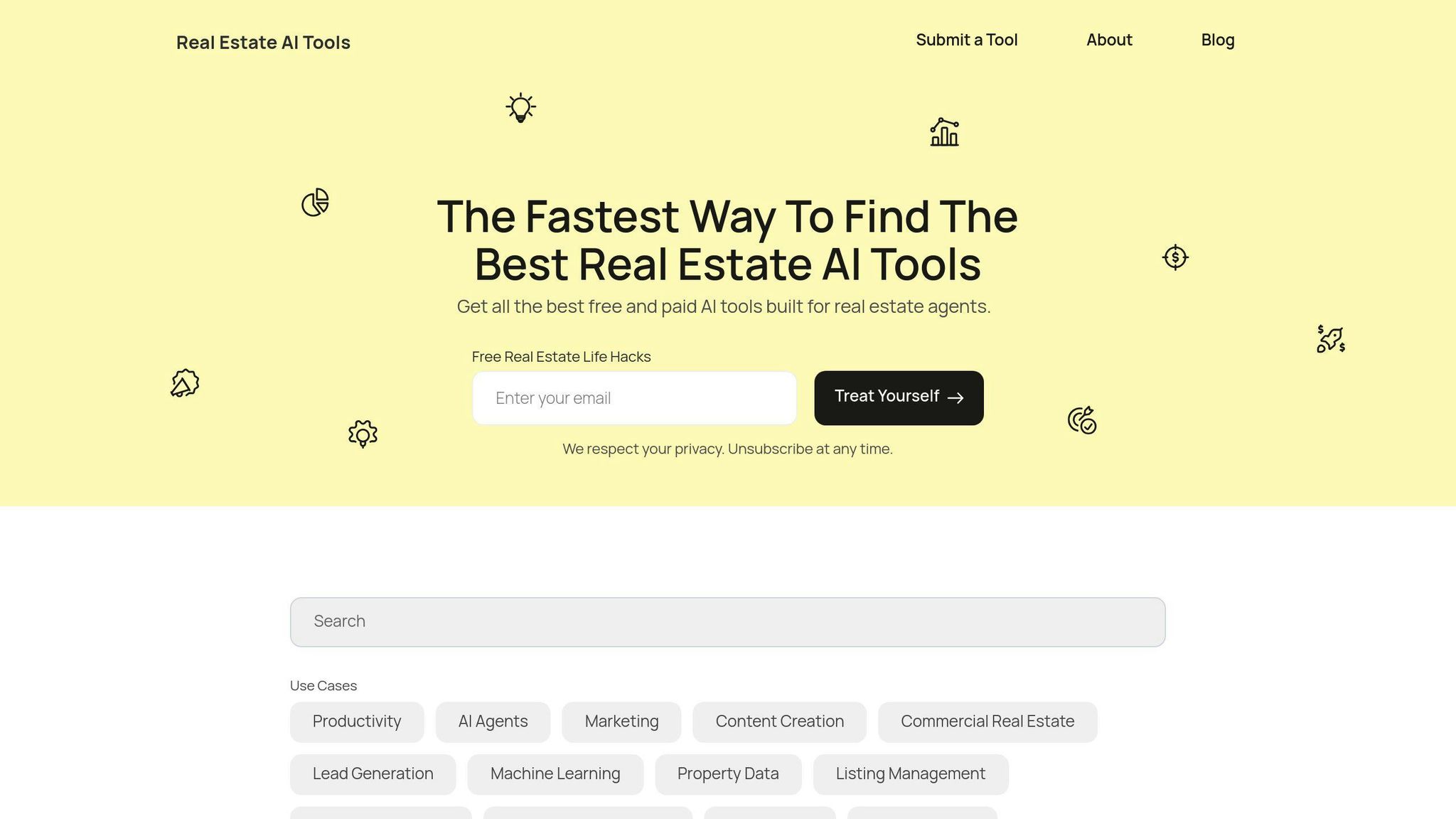AI is transforming how real estate agents track and manage client engagement. By automating routine tasks, analyzing client data, and predicting behavior, AI tools help agents work smarter and connect with clients more effectively. Here’s what you need to know:
- Save Time: AI chatbots handle inquiries, schedule appointments, and collect data.
- Personalized Insights: Tools analyze preferences, communication patterns, and timelines to tailor interactions.
- Predictive Analytics: AI forecasts client behavior, helping agents prioritize leads and improve follow-ups.
- Integration with CRMs: Combining AI with CRM systems centralizes data and enhances efficiency.
With tools like Tidio, Glassix, and Luxury Presence, real estate professionals can automate processes, gain deeper insights, and focus on building stronger client relationships. Ready to take your engagement tracking to the next level? Start by evaluating your current processes and selecting the right AI tools for your needs.
AI in Real Estate: Transforming Client Engagement & Sales
Advantages of AI in Client Engagement Tracking
More than 72% of real estate owners are using AI, showcasing its measurable impact. These tools not only streamline operations but also improve the accuracy and efficiency of client engagement strategies.
Automation of Routine Tasks
AI systems efficiently handle repetitive tasks. For example, AI chatbots like Glassix manage inquiries, schedule appointments, and share property details. This not only saves time but also gathers interaction data for future use.
In addition to freeing up time, these tools provide meaningful insights that help agents better understand their clients' needs.
Tailored Client Insights
AI systems analyze data to create personalized client experiences. For instance, Luxury Presence's AI Lead Nurture Tool uses client data to craft engagement strategies tailored to individual timelines and preferences.
Here’s how AI enhances client insights:
| Insight Category | AI Capability | Business Impact |
|---|---|---|
| Client Preferences | Analyzes search history and actions | Offers relevant property suggestions |
| Communication Patterns | Tracks response times and engagement | Optimizes timing for client outreach |
| Purchase Timeline | Monitors browsing and inquiries | Improves follow-up targeting |
While these insights allow agents to customize their approach, predictive analytics takes things a step further by forecasting client behavior and prioritizing leads.
Predictive Analytics for Decision Making
Tools like HouseCanary and Roof AI use historical data and behavior patterns to identify high-potential leads.
"AI is revolutionizing lead generation in real estate by automating processes and enhancing targeting, allowing agents to focus more on building client relationships." - LeadSync
By predicting client behavior, AI helps agents identify leads, schedule follow-ups, and anticipate client needs. This ensures they focus on opportunities with the highest potential.
Combining automated task management, personalized insights, and predictive analytics creates a robust system for better client engagement, improving operational efficiency and client satisfaction.
sbb-itb-db182b0
AI Tools for Real Estate Agents
AI tools are helping real estate agents better understand their clients and respond to their needs. These solutions are reshaping how professionals manage client interactions and build stronger relationships.
AI Tools For Real Estate Agents

This directory offers a carefully selected list of tools aimed at improving client engagement and simplifying real estate workflows.
Examples of Client Engagement Tools
AI tools today cater to various engagement needs, offering specialized features:
| Tool | Primary Function | Client Engagement Benefits |
|---|---|---|
| Dialzara | Communication Automation | Handles responses, tracks conversations, and schedules follow-ups |
| Epique | Lead Prioritization | Uses behavioral data to score leads and highlight opportunities |
| SEObot | Online Visibility | Enhances listings and monitors client search behaviors |
To get the most out of these tools, integrating them with your CRM system is essential for smooth tracking of client interactions.
Linking AI with CRM Systems
Connecting AI tools with CRM systems boosts their capabilities and simplifies how you track client engagement. For example, Luxury Presence analyzes client data to create personalized engagement strategies.
Key advantages of AI-CRM integration include:
| Integration Aspect | Business Impact |
|---|---|
| Automated Data Collection | Reduces the need for manual data entry |
| Real-time Analytics | Provides instant insights into client behaviors |
| Cross-platform Tracking | Centralizes all client interactions in one place |
"AI's ability to target leads and automate processes is transforming client engagement tracking." - LeadSync
Steps to Use AI for Client Engagement Tracking
Evaluating Current Engagement Processes
To improve client engagement, start by analyzing your current processes. Here's a breakdown of areas to review and how AI can enhance them:
| Area to Evaluate | What to Analyze | How AI Can Help |
|---|---|---|
| Communication Channels | Message timing and frequency patterns | Automate responses and improve timing |
| Lead Management | Qualification process, conversion rates | Use predictive scoring and prioritization |
| Client Feedback | Satisfaction metrics, common issues | Perform sentiment analysis and spot trends |
After identifying improvement areas, move on to choosing the right AI tools to fill these gaps.
Selecting AI Tools
When picking AI tools, focus on how well they integrate with your systems, protect data, and scale with your needs. Resources like AI Tools For Real Estate Agents can be helpful. Key considerations include:
| Selection Criteria | What to Focus On |
|---|---|
| Integration Capabilities | Ensure compatibility with your CRM |
| Data Privacy Features | Meet real estate compliance standards |
| Scalability Options | Allow for growth and feature upgrades |
| Support Resources | Access to training and tech assistance |
Training and Assessing AI Impact
Once you've chosen your tools, proper implementation is key. Set up a framework to measure their effectiveness using these metrics:
| Metric Category | Key Performance Indicators |
|---|---|
| Client Response | Track message open rates and response times |
| Engagement Quality | Measure meeting conversions and property view requests |
| Team Efficiency | Evaluate time saved and lead-handling capacity |
Regularly review these metrics to fine-tune your AI strategy, ensuring a balance between automation and personal interaction with clients.
Conclusion: Using AI for Client Engagement Success
How AI is Changing Real Estate
AI is reshaping the real estate industry, with more than 72% of property owners investing in tools that improve lead management, communication, and overall efficiency. Thanks to AI-powered engagement tracking, real estate professionals are seeing benefits like:
| Focus Area | Business Impact |
|---|---|
| Lead Quality | Automatically separates casual browsers from serious buyers. |
| Response Time | Enables instant interaction with prospects via AI chatbots. |
| Market Insights | Offers data-driven recommendations tailored to client needs. |
| Efficiency | Simplifies workflows and automates repetitive tasks. |
These improvements provide agents with practical ways to incorporate AI into their daily operations.
Steps for Agents to Get Started
After evaluating their current processes and selecting the right tools, agents can move on to implementing AI effectively. Platforms like AI Tools For Real Estate Agents offer a variety of tailored options to get started.
Here’s what agents should focus on:
- Select tools that integrate seamlessly with existing systems and meet compliance standards.
- Track performance metrics to ensure a solid return on investment.
- Strike a balance between automation and maintaining a personal connection with clients.
- Regularly review and fine-tune AI processes for ongoing improvement.


